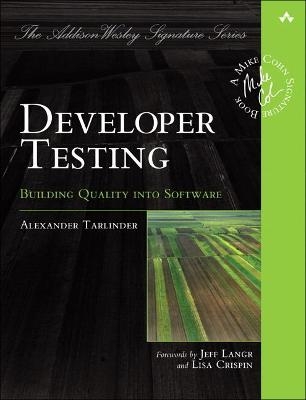
Developer Testing
Addison Wesley (Verlag)
978-0-13-429106-2 (ISBN)
In Developer Testing, leading test expert and mentor Alexander Tarlinder presents concise, focused guidance for making new and legacy code far more testable. Tarlinder helps you answer questions like: When have I tested this enough? How many tests do I need to write? What should my tests verify? You’ll learn how to design for testability and utilize techniques like refactoring, dependency breaking, unit testing, data-driven testing, and test-driven development to achieve the highest possible confidence in your software. Through practical examples in Java, C#, Groovy, and Ruby, you’ll discover what works—and what doesn’t.
You can quickly begin using Tarlinder’s technology-agnostic insights with most languages and toolsets while not getting buried in specialist details. The author helps you adapt your current programming style for testability, make a testing mindset “second nature,” improve your code, and enrich your day-to-day experience as a software professional. With this guide, you will
Understand the discipline and vocabulary of testing from the developer’s standpoint
Base developer tests on well-established testing techniques and best practices
Recognize code constructs that impact testability
Effectively name, organize, and execute unit tests
Master the essentials of classic and “mockist-style” TDD
Leverage test doubles with or without mocking frameworks
Capture the benefits of programming by contract, even without runtime support for contracts
Take control of dependencies between classes, components, layers, and tiers
Handle combinatorial explosions of test cases, or scenarios requiring many similar tests
Manage code duplication when it can’t be eliminated
Actively maintain and improve your test suites
Perform more advanced tests at the integration, system, and end-to-end levels
Develop an understanding for how the organizational context influences quality assurance
Establish well-balanced and effective testing strategies suitable for agile teams
Alexander Tarlinder wrote his first computer program around the age of ten, sometime in the early nineties. It was a simple, text-based role playing game for the Commodore 64. It had lots of GOTO statements and an abundance of duplicated code. Still, to him, this was the most fantastic piece of software ever conceived, and an entry point to his future career. Twenty-five years later, Alexander still writes code and remains a developer at heart. Today, his professional career stretches over 15 years, a time during which he has shouldered a variety of roles: developer, architect, project manager, ScrumMaster, tester, and agile coach. In all these roles, he has gravitated towards sustainable pace, craftsmanship, and attention to quality, and he eventually got test infected around 2005. In a way, this was inevitable, since many of his projects involved programming money somehow (in the banking and gaming industry), and he always felt that he could do more to ensure the quality of his code before handing it over to someone else. Presently, Alexander seeks roles that allow him to influence the implementation process on a larger scale. He combines development projects with training and coaching, and he shares technical and nontechnical aspects of developer testing and quality assurance in conferences and local user groups meetings.
Chapter 1: Developer Testing
Chapter 2: Testing Objectives, Styles, and Roles
Chapter 3: The Testing Vocabulary
Chapter 4: Testability from a Developer’s Perspective
Chapter 5: Programming by Contract
Chapter 6: Drivers of Testability
Chapter 7: Unit Testing
Chapter 8: Specification-based Testing Techniques
Chapter 9: Dependencies 1
Chapter 10: Data-driven and Combinatorial Testing
Chapter 11: Almost Unit Tests
Chapter 12: Test Doubles
Chapter 13: Mocking Frameworks
Chapter 14: Test-driven Development—Classic Style
Chapter 15: Test-driven Development—Mockist Style
Chapter 16: Duplication
Chapter 17: Working with Test Code
Chapter 18: Beyond Unit Testing
Chapter 19: Test Ideas and Heuristics
Appendix A: Tools and Libraries
Appendix B: Source Code
Bibliography
Index
| Erscheinungsdatum | 04.10.2016 |
|---|---|
| Reihe/Serie | Addison-Wesley Signature Series (Cohn) |
| Verlagsort | Boston |
| Sprache | englisch |
| Maße | 180 x 230 mm |
| Gewicht | 565 g |
| Themenwelt | Informatik ► Office Programme ► Outlook |
| Mathematik / Informatik ► Informatik ► Programmiersprachen / -werkzeuge | |
| Informatik ► Software Entwicklung ► Qualität / Testen | |
| ISBN-10 | 0-13-429106-9 / 0134291069 |
| ISBN-13 | 978-0-13-429106-2 / 9780134291062 |
| Zustand | Neuware |
| Haben Sie eine Frage zum Produkt? |
aus dem Bereich


